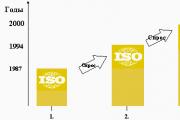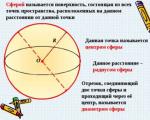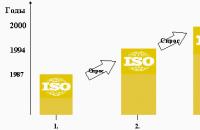16.07.2024
Types of trading in Russia: concept, classification and forms. Types of tenders According to the specifics of admission
What is a tender - the essence of the process. Classification into 3 types + 5 areas for tenders. How to take part in the auction - list of documents + 5 government + 10 commercial online services.
In itself, such a concept as “tender” has never been defined in the legislation of the Russian Federation.
Since this word is of foreign origin (and it is translated as “proposal”), there is reason to assume that the very idea of holding it came to Russian territory from the west.
For today, tender is an opportunity for several enterprises to compete for the right to provide goods or services to both private and public enterprises.
Also, in legislative documents, this process is often referred to as bidding.
The essence of the tender: 3 simple steps
The entire tender process can be reduced to 3 consecutive steps:
- Customer (state or private enterprise) holds a competition for the best offer (provision of services, delivery of goods, performance of work) with the parameters and terms of the transaction set in advance.
- From various companies applications are being received, which are then viewed, and themselves firms are checked for authenticity.
- After analyzing the proposals received, the customer chooses the company that interested him most with its conditions.
He signs a cooperation agreement with her.

What are tenders: classification into 3 types
Basically, there are two types of tenders - closed and open. Also, some experts identify a third type - special tenders, in which only certain applications can participate.
Let's look at each format in more detail.
1) Tenders “by invitation”
Closed tenders consist only of certain companies that are invited by the organizer of these auctions.
“Pass” to participate may depend on the following characteristics:
- company status in the market;
- the image she created;
- other similar significant moments.
Another feature is that the list of participants is not disclosed.
It is known exclusively to the customer (ideally) in order to exclude the possibility of collusion between these companies.
Typically, 4 to 6 companies participate in a closed tender.
Another advantage of the secrecy of such events is that none of the competing firms suspects what conditions the other may offer.
Based on the factor of uncertainty, enterprises sometimes themselves set more favorable conditions than those they could offer after analyzing their competitors.
2) Tenders in which everyone can participate
Open tenders– this is the case when the customer announces a competition, and everyone can take part in it. Notice of bidding is distributed through various sources:
- newspapers,
- internet newsletter,
- radio, etc.
Anyone can familiarize themselves with all the requirements for participation.
The main advantage of this format is that participants can familiarize themselves with the competition materials and assess their chances of winning.
The positive thing for the customer is that he will receive a large number of applications. This makes it possible to choose the most favorable conditions among those offered.
The important thing is that the potential executor of the order is obliged to give a guarantee, which will be confirmed by the bank.
3) Bidding for people “in their own circle”
Specialized tenders with limited participation- this is the official name for tenders where a specific list of participants is not defined, as in closed ones.
But, at the same time, not all companies can participate in them.
Participation in these auctions is limited by special rules. For example, only those participants who are citizens of the country where this tender is held are allowed.
In what areas are tenders held?
Tenders are held by both private companies and government agencies, so the range of areas is so huge that it’s impossible to count. The most common of them can be cited, for example:
Thermal power engineering.
In this area, most often there is a need to select a material supplier.
Medicine.
In this activity, it is possible to hold a tender for both the purchase of pharmaceuticals and the purchase and maintenance of medical equipment.
Sphere of civil defense.
Service.
Everyone needs it: from choice to security companies.
- Competitions are often held for construction of entire residential areas.
How to take part in the tender?
Each tender participant is required to fill out an application. It is drawn up in free form; there are no established samples (except when required by the conditions of a specific tender). But there is another important rule: all information must be confirmed by the necessary documents, according to.
Also, in the case of government orders, additional requirements are attached that are regulated by law...
In the event that not all requirements and conditions are clear, any bidder can fill out a request in free form, to which he is required to respond.
What documents are required from the customer?
Tender documentation plays a significant role - that is, papers that customers, for their part, are required to provide (remember the tender diagram given above).
The list of tender documentation includes acts that must be attached to the invitation to participate. Without these documents, bidding will not be a full-fledged tender.
Necessary documents when drawing up an invitation to participate in the tender auction:
- Conditions under which the company that wins this auction will provide a service or product.
- Invitation from the customer, which states the terms or will have links to them.
- Detailed instructions holding a tender.
- Bank guarantee, which is needed only under certain conditions.
What does the tenderer present?
The potential contractor must also provide documentation about the enterprise:
- Statutory documents of your enterprise.
- A document that confirms the registration of a company.
- Company account information. They are needed because those enterprises that are on the verge of bankruptcy cannot be allowed to participate in the tender.
- Documents of the representative who represents the interests of the company taking part in the auction.
- If necessary, the organization must bring all licenses if their presence/absence may affect the customer's decision.
The exact requirements for the attached documentation are put forward in accordance with the scope and type of services/products.
Therefore, the participant must clarify the list in each specific case.
Online auctions and their benefits
The most profitable and inexpensive are electronic auctions.
Essentially, the system remains the same, but the process itself moves into the online space.
This format is a big plus for budding entrepreneurs, as it makes it possible to take part in the auction by finding it using a search engine.
Percentage of searching for a contractor (supplier) using electronic auctions:

5 most famous electronic trading platforms:
- "Sberbank-AST for government procurement": https://www.sberbank-ast.ru
- "National Electronic Platform": https://www.etp-micex.ru
- "RTS-tender": https://www.rts-tender.ru/about/news/PgrID/634/PageID/3
- State Unitary Enterprise "Agency for State Order, Investment Activities and Interregional Relations of the Republic of Tatarstan": https://agzrt.ru
- JSC "Unified Electronic Trading Platform": https://www.roseltorg.ru
The mechanism for conducting a tender using the Internet is greatly simplified. However, this statement is only relevant for government auctions.
In the case of private companies, in order to find the necessary tenders, you need to scroll through more than one website.
Unfortunately, there are no special online platforms for conducting commercial tenders.
But finding one, if desired, will not be a big problem. The search parameters depend directly on the purpose, scope of services or goods provided.
As an example, here is a list of several commercial online auction services. These mainly include procurement tenders, such as:
- "Sberbank-AST for commercial procurement": https://utp.sberbank-ast.ru/Com/NBT/Index/0/0/0/0
- "ONLINECONTRACT": https://onlinecontract.ru/
- "Auction Competitive House": https://www.a-k-d.ru/
- SETonline: https://www.setonline.ru/
- OJSC Severstal: https://www.severstal.com/rus/suppliers/srm/
- "BashZakaz.ru": https://etp.bashzakaz.ru/
- "Tender.Pro": https://www.tender.pro/
- "REGION-AST": https://region-ast.center/
- "TRADE 223": https://torgi223.ru/
- "Procurement Automation Center": https://etpcaz.ru/ and others
Does it make sense to hold a tender?
The idea itself seems interesting and progressive. Abroad, everyone has known about this practice for a long time. Most Russian enterprises, both private and public, have also switched to this system. One can talk for a long time about the advantages of holding a tender in general terms. However, there are many nuances that are directly related to the Russian mentality.
It is worth considering the factor that most of these trades cannot be called objective. Moreover, the company that ultimately fulfills the order, upon closer examination, turns out to be far from the most profitable offer.
Nevertheless, they win the tender. In the case of state auctions, in order for an entrepreneur to become a winner in the tender, it is enough to simply indicate the benefits for those responsible for the choice.
The interesting thing is that when it comes to a private entrepreneur, he will rarely show the same policy. After all, he is the owner of this organization, and is personally interested in obtaining quality at a reasonable price.
Unlike the standard method of bidding, an online tender is one of the most transparent, because most of the information about the order is displayed during a regular Internet search.
And only in special cases does this require certain access.
In order to participate in the tender, you need to submit an application.
How to prepare it correctly, watch the video:
Conclusion about what is tender?
Naturally, there are many advantages to this process. But all of them are real only under the condition of fair bidding, the presence of transparent conditions, as well as the desire of the representative or manager of the enterprise to truly choose the most favorable conditions.
What is a tender, and how to benefit from it, everyone understands in their own way.
But initially, this is one of the most convenient mechanisms for entrepreneurs to find each other for further cooperation.
The transition of such processes to electronic form simplifies the solution of many business problems. After all, in order to participate in an online tender, it is not necessary to “hang around” in certain circles.
It is enough to know a couple of services with electronic auctions and be able to use search engines.
Useful article? Don't miss new ones!
Enter your email and receive new articles by email
Parity– the rules by which you can participate in tenders are equal for everyone. Due to this, it is not possible to evaluate participants personally.
- Security. If a participant notices violations during the auction, he has the opportunity to submit an application to the FAS.
- Availability. You can take part in tenders remotely, which makes it possible to simultaneously test your strengths in different tenders.
- Transparency. Each participant monitors the bidding procedure and is also aware of the terms of the contract with the winner.
- Publicity. Each potential participant has the opportunity to learn more about the auctions that interest him most, as well as about the procedure for conducting them and the terms.
Quote concept
There are tenders in which everyone is allowed to participate without restrictions. The winner is the one who can offer the best low price. However, at the same time, the cost of the contract cannot be higher than 500 thousand rubles.
To participate in the tender, you must indicate in your application:
- cost of work, service or product;
- details;
- Your agreement to fulfill the terms of the contract; the draft contract is submitted in parallel with the notice.
It is very important to read the contract carefully because once you agree to comply with its terms, you will not be able to make amendments.
Only in the case where the notice indicates the need to attach documents to certify inclusion in small businesses or socially-oriented non-profit companies, it is worth attaching them.
The quote request process includes the following steps:
:
- submission of applications (from 4 days for an amount up to 250 thousand rubles; from 7 days for an amount up to 500 thousand rubles);
- evaluation of applications (during the day);
- protocol of summing up;
- waiting for the conclusion of a contract (7-20 days);
- direct conclusion of the contract.
Advantages and weaknesses of quotation
Among advantages requests for quotations can be distinguished:
- I analyze and evaluate applications throughout the day;
- a very simple and fast implementation scheme;
- submission of a quotation application only;
- no need for collateral.
It is important to note that the customer does not have the right to request the submission of additional information and data. As a result, the scheme is simplified for suppliers, but the customer in such a situation risks ending up with an unscrupulous supplier.
Cons:
- a huge number of participants, and therefore the price determines everything;
- the number of quotes has decreased significantly.
The concept of an electronic auction
In essence, an electronic auction is a trade in which the winner is the participant who names the lowest price. This event takes place on specialized electronic platforms. Bidding is reported publicly by placing an advertisement in one information system.
There are open and closed auctions. A closed auction format occurs when information about the tender is closed; in this case, only invited persons act as participants. More often, open auctions are held - this is a simple form that involves evaluating applications, conducting bidding, sometimes a slightly more complicated form of auction is used, when the participant must submit an application in two parts. Such an auction is more efficient and fair. Since the first part of the applications does not have information about the participant, it contains exclusively technical information according to the topic of the tender. All participants who are allowed to take part in the tender are anonymous. Only the second part of applications contains information about the participant, and it is considered after the auction.
The auction procedure includes the following stages:
Submission of applications (from 15 days);
- evaluation of the first part of applications (up to 1 week);
- waiting for the auction (3 days);
- auction;
- evaluation of the second part of applications (up to 3 days);
- protocol of summing up;
- conclusion of a contract.
Competition concept
A competition is a form of bidding in which the winner is the proposal that has more effective terms for fulfilling the contract. This means that for a competition, the main parameter for evaluating an application is not only the cost, but also the high quality of the product or the amount of maintenance costs, etc. There are closed and open competitions. In turn, they are divided into a two-stage competition, as well as a competition with a limited participation. More common open competitions. Closed competitions are held when state secrets are involved.
The competition procedure includes the following stages:
- accepting applications (from 20 days);
- evaluation of applications (up to 20 days);
- protocol for consideration of applications;
- waiting for the conclusion of a contract (10-20 days);
- conclusion of a contract.
How can I find tenders?
For this purpose, a specialized resource of the Enter Group company has been developed - a program for searching tenders and auctions free of charge for 14 days. It stores a complete database of tenders, information is constantly updated in real time. Searching for tenders on all sites for free directly in 1C is simple and straightforward. If you have any doubts, please contact us. We will answer your questions.
The term itself does not fully reflect the essence of domestic business practice. Firstly, it never appears in documents regulating relations between the parties, and secondly, the procedure is sometimes somewhat similar to.
First, you need to clarify that the law does not contain the concept of tender; this process is called a competition, bidding, or auction. But the main feature is the same for all these designations. Based on the auctions (tenders), an agreement is concluded between the seller and the buyer, but the first party here is the one who won in a kind of competition with other participants. In essence, here several sellers are fighting for one contract, the terms of which are determined by the buyer.
The practice of doing business between entities of various formats (public and private) is necessarily transferred to a competitive basis. The same principle is often used by commercial organizations that are looking for profitable offers from suppliers.
How does the tender work?
So, by and large, we don’t have tenders. Everyone who practices this sales format participates in competitions, auctions, trades... But no matter what they call it, there are a number of characteristic features that distinguish this version of business relations from others:
- the buyer states his conditions in strict form;
- they compete for the contract;
- the whole process takes place in accordance with a certain procedure.
An entrepreneur should understand tenders, if only because they provide an opportunity to get new clients. And this may not only be of interest to those who are targeting buyers financed from budget funds. Many commercial organizations and companies find suppliers through tenders.
Why are tenders held? Actually, this combines the desire to get the most from the supplier on the buyer’s side and the regulation of the entire procedure. Government agencies organize competitions and auctions because this is required by law. This format assumes that they will save budget money by finding the cheapest and most profitable supplier in this way. The same thing drives commercial organizations.
And here it is worth understanding that the seller who wins the tender will not always be in an advantageous position. This is based on several points:
- It is necessary to offer the lowest price among the participants, perhaps even unreasonably low.
- The terms of the contract will have to be fulfilled even when it is not economically profitable for the supplier or contractor. For example, in the event of an increase in the cost of materials, components, energy resources, etc., associated with inflationary processes or an increase in exchange rates, the final product will have to be sold to the contract holder at the price established by the tender. Sometimes even at a loss.
- Winning a tender requires lengthy preparation and the strictest possible adherence to established rules for the preparation of documents. In addition, the process of working on sites where competitions are held has a number of nuances, and in order to fully comply with them, an entrepreneur needs to spend certain expenses, for example, purchasing an electronic signature.
Advice: when starting to work with tenders, do not try to immediately go for large and long-term transactions, this is a completely different level than opportunity. Do not forget that refusal of a contract or its failure to perform in full may lead to unpleasant consequences in the form of compensation to the buyer, compensation for damage or lost profits, inclusion of the supplier in the register of unscrupulous ones, and the like.
Types of tenders and their classification
Once again, it is worth emphasizing that for domestic business, the term tender unites purchases organized according to a certain procedure on a competitive basis. That is, it is conditional. Other names are legally established.
Tenders have their own gradation, accepted in domestic business:
- Competitions vary in composition of participants:
- municipal (state), where the customer is a budget organization, and budget funds will be used for procurement;
- commercial, where the acquisition is carried out at the expense of the company’s own money or attracted by it.
- There are types of tenders based on the form of procurement:
- The competition is held in the case of complex and expensive contracts, for example, in high-tech projects, construction, IT, and defense sectors. It may have several stages, open and closed format, and also be non-competitive.
- Request for quotes or price list competition. A special feature of this technique is the small purchase amount, usually up to half a million rubles.
- Auction or electronic trading. The format is used by all market participants who have the status of a municipal or state customer. All electronic auctions are held on special platforms selected by the Russian government. Legislative support – Law 94-FZ.
Advice: an entrepreneur (potential supplier) must begin his participation in tenders with a careful and detailed study of this particular Law - 94-FZ. Also, do not forget about Law 223-FZ, which regulates procurement of individual legal entities. The documents themselves are quite difficult to understand; you will have to study and re-read them ten times to fully understand the details. However, without this stage, it is unsafe to start operating as a seller on electronic platforms; there are risks not only of wasting time, but also of bringing trouble on yourself and your company.
It should also be noted that special situations occur in this area. There are many myths surrounding this delivery format that there is a serious corruption component. It is impossible to completely deny this possibility, and it is pointless. Often, tenders actually become a tool for negotiated transactions. Or rather, their purpose is to exclude elements of corruption from practice, but it is present, and it is impossible not to admit it.
“Symptoms” of contractual tenders - how to distinguish such proposals?
Here you need to take into account one feature of that part of the domestic business where budget organizations act as customers. All their activities have been transferred to the procurement rails, squeezed into the strict framework of the procedure. Any of the applicants who correctly fill out the application and documents and also offer the lowest price can win the contract.
But what about the other components? For example, the ability and ability of the supplier to respond to the buyer’s urgent wishes in terms of timing, flexibility, and some other nuances of making deliveries? Very often, a buyer who has already worked with a certain supplier wants the contract to go to him. After all, it has already been time-tested and fully suits all parameters... But in a situation with a tender, this is absolutely not necessary. The contract may have to be concluded with some unknown (for the customer) organization, which is still a dark horse, and working with it will not always be comfortable. That is, winning a tender based on the pricing platform does not guarantee the buyer its performance in other parts. In addition, he has no confidence that the supplier will be able to fully comply with the conditions preferred by the customer.
That is why in practice there are such contractual tenders, when the buyer, by all means and cleverly placed commas, creates such formal conditions that purposefully make it difficult for other participants to obtain a contract that have not received approval in advance. And this approach does not always indicate a corruption background, that is, roughly speaking, bribes, kickbacks and the like. Although you shouldn’t participate in such a tender either, unless your company is the one that received the preliminary go-ahead.
So, how can you recognize a tender where the parties have already obviously reached an agreement, and its conduct itself is a formality?
5 components of “negotiated” tenders
It is worth noting that this approach is almost uncharacteristic of commercial structures. The companies' own money is involved, the control is much stricter, the goals are purely to find a profitable supplier, and the approach to the procedure is much more flexible. That is, businesses do not have an “obligation” to hold tenders; expediency and efficiency come into play here. Although there are a number of cases where hired employees of commercial structures were very interested in gratitude from suppliers for “help” in concluding contracts, and, conversely, performers found themselves in unpleasant situations with unscrupulous customers, having worked out part of the contract and not receiving payment for the product or service.
Advice: Having received an invitation to a tender from a commercial organization, carefully check the business reputation of the customer.
Government procurement is more susceptible to such a disease as contractual tenders. Their signs:
- fuzzy, unclearly stated, extremely confusing, contradictory in parts terms of the technical specifications;
- short, clearly unrealistic deadlines (every entrepreneur who knows his field can determine where the time frame is at the limit of possibilities and where it is beyond);
- inflated contract costs combined with strangely detailed requirements for the supplier;
- the condition that the application must be accompanied by an already completed part of the work;
- The customer's tender history consists of contracts with a very limited number of companies.
All these are signs that the buyer is using a technique to scare away “leftist” suppliers. In some cases, the tender is held “for show”; the contractor has been working on the project for a long time. Fighting for such contracts is at a loss, unnecessary headache, time and money costs. No, of course, you can appeal the results of the tender by submitting a corresponding application to the FAS. But this should only be done if the company has already built up “muscle mass”, has experience in this kind of bidding, and has competent specialists on staff who can prove you are right.
Although you need to understand that the widespread opinion about the mass nature of contractual tenders is a myth. The vast majority of applications from customers on electronic trading platforms do not have a corruption component, and participation in them is much less risky than investing in.
If you want to start making money on government procurement, then you will need to go through a preliminary stage of preparation for this. Moreover, it is quite complex and labor-intensive.
How to work with tenders for dummies - step-by-step instructions
Once again, it must be stated that commercial structures act a little differently than government ones when choosing a supplier on a competitive basis. The former develop the procedure on their own; they are not limited by rigid boundaries; they can involve those they know or are interested in participating, or they can announce an open competition in the media or on specialized Internet platforms.
State or municipal organizations operate within the framework of a legally prescribed procedure. Therefore, to become a tender participant, an entrepreneur must:
- study Law 94-FZ, namely the procedure for selecting a supplier prescribed therein, which sets out the rules for the tenderer;
- select an ETP from five that are selected by the government of the Russian Federation (for electronic auctions for government procurement);
- obtain an electronic digital signature (the certification center issuing the digital signature must be one of those accredited at the selected site);
- install the necessary software;
- undergo accreditation at the ETP to participate in the tender;
- take part in electronic auctions;
- sign a contract upon winning.
Actually, the algorithm itself is not that complicated, if this is not the first time. There are several nuances that you need to pay attention to:
- Unfortunately, universal digital signatures have not yet been invented. Therefore, the tax certificate issued to you cannot be used to participate in the tender; you will have to get another one.
- When choosing a platform for electronic auctions, you need to pay attention to its specialization and working conditions.
- Each site out of the 5 selected has detailed instructions and user guides. They are written in detail, even too much. Do not neglect to study them carefully before starting work on any of the ETPs.
- The key to successful work can be such a banal thing as paperwork. A good source of information and obtaining the necessary skills can be the competition documentation of competing organizations.
- As a rule, in all electronic auctions there is a principle of securing intentions, that is, a cash deposit. It is calculated as a small percentage of the transaction amount, but nevertheless, like , participation in the tender costs money. Although this is a repayable amount, for large contracts the supplier company may not have enough of its own money, and it may not be advisable to “freeze” working capital. Therefore, it is worth either taking care of the availability of a reserve, or a bank guarantee that can be used for these purposes.
How to participate in construction tenders?
The algorithm for passing the preparatory stage has already been described above. There are practically no differences for the construction industry. There are only a number of nuances that a new company needs to take into account in tenders:
- Just participating in tenders, even without winnings, will help the company make itself known, they may pay attention to it, and this will improve its status.
- When preparing an application, special attention should be paid not only to the essence of the offer (the applicant’s proposal), but also to its justification, which is contained in the information about the company. This may be a description of special equipment, technologies used, a presentation of similar objects put into operation, reviews of established customers, and the like.
- As a rule, construction tenders are carried out in two stages. The first is the announcement of the start of the competition and information about the proposed project, the second is the analysis of submitted applications and the selection of the winner. In a closed bidding format, you can become a participant only by invitation from the customer. It is worth considering that the entrance ticket sent does not always mean that the company is a welcome guest. If the deadlines for submitting an application and preparing documentation are very tight, then this should certainly lead to the idea that everything has already been agreed upon with another contractor, whom they want to see as the second party to sign the contract. Your participation is necessary for formal compliance with the procedure.
- Today, this format is becoming increasingly widespread in the construction of small and small projects and private housing. That is, almost the entire construction industry is put on a tender basis. A number of experts believe that this will improve the quality of work in general and take the entire field to a new level. In fact, competitions or auctions are the future.
Among representatives of various organizations and enterprises, one can increasingly hear about the term “tender”. However, few people know that it is this set of measures that helps some companies find other contractors with maximum benefit for themselves. We will tell you in more detail what a tender is and all the nuances of its implementation in our article.
Brief background about the tender
The concept of “tender” was first discussed in America at the end of World War II. It was the Americans who came up with the idea to develop a tender system. The fight against corruption played a certain role in this. As it turned out, a lot of money ended up in the pockets of dishonest officials and was not used at all for the needs of the public.
In Russia, they learned about what a tender was a little later, closer to the harsh 90s. However, most business leaders did not try to take advantage of successful innovations, since they had not yet had time to really understand everything.
In addition, at that time the spirit of nationalization reigned in the cities and made it difficult to understand the essence of the issue. But time put everything in its place, and they started talking about tenders seriously. So what is it and what can it be used for?
"Hu from xy", or what constitutes a tender
What a tender is can be learned from the literal interpretation of this word. In English, “tender” is translated as “bargaining” or “competition.” In other words, this concept implies holding some kind of conditional competition between suppliers of goods and services in order to attract the most promising customers. Moreover, this competition takes place taking into account the rules specified in the regulations of the company organizing it.

Several features of the tender
Like any competition or event related to bidding, the tender has a number of its own characteristics. For example, all information relating to a particular financial event is, as a rule, in the public domain and is as transparent as possible. Only the participant who, in the customer’s opinion, has provided the most attractive services or profitable products, can win such a unique competition.
In turn, private or public companies that are interested in the tender can act as the organizer of the competition. Unlike a commercial structure, government organizations hold the event at the expense of the budget, and not at the expense of sponsors.
To participate in the auction, you must submit an application for consideration by a special competition commission. And finally, this action has its own standards, consisting of three parts: an auction, a competition, and a request for quotes.

Where can the auction take place?
Most trading is usually carried out on special virtual platforms. Moreover, their choice depends on the type of activity, needs and experience of the future participant who wants to win the tender. The electronic trading platform, in turn, serves as a starting point for organizers and suppliers of services and goods.
On the expanses of this Internet resource, which actually acts as an intermediary between the seller and the customer, specialized electronic auctions are held, online transactions are carried out, and full training for beginners is provided. A striking example is the RTS platform.

RTS platform: what, where and how?
"RTS-tender" is an electronic trading platform that has existed since 2010 and allows for procurement for the needs of municipal and state significance. According to its regulations, the following persons are involved during the auction:
- customers;
- site operators;
- representatives of a specialized authorized government body;
- suppliers of services and goods;
- independent registrars;
- representatives of regulatory and inspection authorities;
- employees of the certification center.
“RTS-tender” (electronic platforms of this type are federal platforms) contains separate tabs on the rules of tendering, gives advice to beginners and provides a range of services for customers and performers.

For example, buyers on the portal are offered a complete legislative framework regarding tenders and are allowed to use analytics to monitor all electronic procurements in the region.
The RTS-tender platform gives sellers the opportunity to undergo accreditation and find a suitable customer. By the way, customers themselves are provided with a free verification of the supplier immediately after they go through the registration procedure and place an application for organizing a tender. At the same time, they have the opportunity to monitor the status of a possible counterparty throughout the tender.

How does tender lending work?
In addition, the site operates tender lending, which allows the customer to participate in a large number of auctions, which increases his chances of winning the auction. To complete it, you just need to go to the page of the auction you are interested in and click on the “Loan Application” link.
After this, the RTS-Tender portal will automatically redirect you to your personal account to fill out the required electronic form and affix it with a virtual seal.
How is the bidding carried out?
Before the tender itself, a number of preparatory activities take place to help protect the safety of all bidders. In particular, the customer company assembles an independent commission, whose members have the necessary knowledge to analyze the subject or object participating in the tender. They help control all stages of the auction.
Further information about the upcoming auction, taking into account the package of documents required for participation, appears in the media and on electronic platforms. At the same time, everyone submits applications, each of which is reviewed and entered into a single list of participants and a special journal. Afterwards, all potential applicants are registered and their proposals are considered. Based on the results of the auction, the winner is announced, whose name is also included in public sources.

What documents are needed to participate?
To participate in the tender, you must provide the following documents:
- application and questionnaire indicating basic information about the service provider or seller;
- commercial offer;
- an explanatory note (as a rule, calculations are carried out in it and deadlines are indicated);
- lists of possible subcontractors necessary for the further implementation of the contract.
What documents are provided for the customer?
When participating in the tender, the customer must provide commercial and technical documentation. In this case, in the first case, he is obliged to fulfill the following points:
- describe the object of the auction itself;
- provide detailed information about the requirements for applicants;
- describe the terms of the future contract;
- provide all participants with an open information card;
- indicate the procedure for submitting applications for bidding.
In the second case, the customer describes the cost that suits him, the payment schedule, payment details and proposed financing options.
What types of tenders are there?
Conventionally, tenders can be divided into five types:
- open type;
- closed type;
- two-level;
- tenders requiring a request for price quotations;
- tenders involving tenders with purchases from only a single supplier of goods and services.
Opening auction: what is it?
Open tenders require the participation of all willing suppliers and are characterized by healthy competition, openness and the most transparent conditions. Details and conditions of the competition can be found in the press and the Internet. Also, detailed information about the timing, participants and rules for submitting applications can be obtained from the virtual tender site (electronic platform where tenders are held).
What is closed trading?
Closed bidding involves the participation of a strictly limited number of participating companies holding a specific license. Such a competition is usually held when it is necessary to sell or order specific products or services. For example, a closed tender is relevant during government procurement of products necessary for the needs of the defense industry.
What is a two-stage tender and request for quotations?
Two-stage tenders involve organizing complex procurement or solving specific technical issues. And, based on the name, such tenders consist of two stages: first, basic applications are submitted without specifying details, made on the basis of the primary assignment from the customer; then, the application is resubmitted, but taking into account specific prices, deadlines and schedules.
When requesting quotes, the customer typically selects suppliers based on their identical features. For example, he can choose between several firms providing clearing services. The winner in such a tender is the supplier who offers its service at the lowest price.
When is it possible to purchase goods and services from one seller?
Purchasing goods and services from one supplier is possible in the following situations:
- when the seller is an exclusive representative (monopolist);
- in case of refusal of other auction participants;
- in case of exclusion from the auction of all applications except one.
Unlike other types of tenders, in this case there are no auctions. If there is only one supplier, a simplified system of concluding a transaction occurs, ending only with the signing of a contract by both parties.
Now you know exactly what a tender is.
Speaking about the current state in which the classification of tenders exists, it is worth highlighting the main reasons for which it is carried out - this is the composition of the competitors, the number of stages of the tender procedure, as well as the specifics of admission to participation in the competition.
Based on the composition of competitors, all tenders are divided into:
- Open. Absolutely all companies and enterprises whose professional activities relate to the very area in which there is a need to fulfill this order have access to them. The organization of these tenders is subject to public announcement, which is implemented by placing notices in various media. As a rule, there are a large number of applicants to participate in open tenders, which makes it possible to obtain more favorable contract terms.
- Closed. A limited number of organizations participate in the competition - as a rule, these are quite large companies or groups of companies.
- With limited participation. When organizing this form of tender, the customer sets a set of requirements that the competitors must meet. These may include a specific country, the presence of a certain qualification level, and many others. etc.
Depending on the number of stages, tenders can be:
- One-stage - take place without negotiations; An application is submitted simultaneously to be included in the list of competitors and to win the tender. After passing one stage, the winning company is determined.
- Two-stage - imply a preparatory and main stage. At the first stage of the tender, competitors put forward technical proposals without specifying specific prices. The second stage marks the selection of the most advantageous proposals, often the adjustment of certain aspects of the tender documentation and, finally, the announcement of the financial aspect - the price of each proposal. At the end of the second stage, the winner of the tender is selected, a contract is drawn up and signed by both parties. But it is worth saying that such a lengthy and painstaking process is carried out infrequently - only when holding a tender for some very expensive and/or specific product/service.
According to the specifics of the permit:
1. General admission procedure
2. The admission procedure, which provides for preliminary selection according to the level of qualifications.
The material is the property of the site. Any use of the article without indicating the source - the site is prohibited in accordance with Article 1259 of the Civil Code of the Russian Federation
What are bidders discussing today?
02.09.2019
What the digitalization of procurement will lead to, why complaints to the FAS can result in a fine, and what risks suppliers face for failure to fulfill government contracts - in our new news release
























